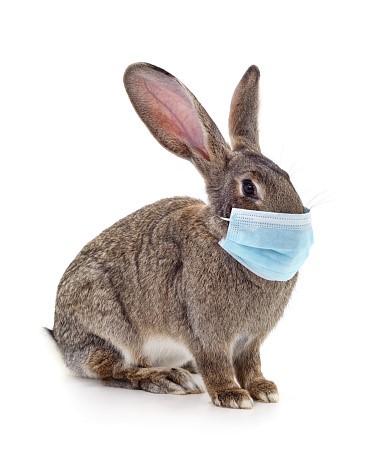As we all now know, viruses are very difficult to keep in one place. Rabbit Hemorrhagic Disease Virus (RHDV) is a calicivirus that has been associated with rabbit populations in China and Europe, but had never been an issue here in the US. Unfortunately, that changed recently with the discovery of a variant that affects pet and wild rabbits (as well as pikas) called RHDV-2 in the US. It was first documented in an isolated outbreak in Ohio in 2018, then in Washington State/British Columbia in 2019-2020 and another isolated outbreak in New York in 2020. Currently however there is a new variant causing an ongoing widespread epidemic across the Southwestern US and northern Mexico, and there has been at least one case of the same variant diagnosed in Florida.

image courtesy https://media.istockphoto.com/photos/rabbit-in-the-medical-mask-picture-id1208392037?
RDVH-2 can be very difficult to diagnose and carries a high mortality rate. The liver and spleen are the organs most often affected, and rabbits that survive can spread the virus for weeks once the illness from the infection has resolved. Signs to watch for are likely nonspecific (not eating, depression, lethargy) or may be related to liver disease (jaundice, fever), and animals may or may not have obvious outward bleeding around the mouth or nose. Often RHDV-2 is rapidly fatal and sometimes death is the first sign you see. In the recent outbreak, up to 90% of infections have been fatal in some areas.
There are vaccines for this disease, however there are no FDA approved vaccines currently available in the United States**. In states with confirmed cases, vaccines have been ordered from overseas (mostly France and Spain), which is a complicated and expensive process. Because of the large orders required to make the process cost effective, many practices have ordered vaccines for prepaid “clinics” where they have as many rabbits vaccinated in one day as possible. Once a bottle of a 50-dose vaccine is opened, it is only viable for 2 hours, so vaccinations need to happen quickly. Individual doses may be available, but they will likely be much costlier.
At Exotic Vet Care, we are doing all we can to have the groundwork in place for ordering RDHV-2 vaccines if/when we need them. However, we are not legally allowed to import it until a case is confirmed within the borders of our state. Once we do get it, we would like to vaccinate as many rabbits as possible to help prevent the spread to our pet rabbit population. If you would like to get on the preregistration list to be among the first notified when we start planning our clinics, please email us here.
**UPDATE! As of November 2021, we HAVE the approved vaccine available and are working to vaccinate every rabbit! Read more HERE!
Unlike the SARS COV2 virus that we have been battling in the human world, RHDV-2 is extremely resilient in the environment, and pet rabbits can be infected from environmental contact with contaminated areas. It can also be spread by people handling live or dead wild rabbits and then contacting their own rabbits. Biting insects can also transmit the virus.
Until the vaccines are available, please do not let your pet rabbits outside where they could come in to contact with wild rabbits or areas where they have been. Avoid all dead wild rabbits and report them to local animal health officials (see below). Do not allow or encourage wild rabbits in your home or yard. If you own rabbits, and interact with other people’s rabbits, try to change your clothes and shoes before entering your home or contacting your own pets. Use caution and consider avoiding congregations of rabbits such as rabbit shows and fairs if you have rabbits at home.

image courtesy https://th.bing.com/th/id/OIP.JWOvr6iejplB0WPKzINUNwHaEt?pid=ImgDet&rs=1
If you find dead wild rabbits, please contact South Carolina Department of Natural Resources. A link to the phone numbers for their regional offices can be found here:
SCDNR – Contact us
If your pet rabbit is showing any signs of illness, please contact us as soon as possible. If RHDV-2 is suspected, we recommend you submit samples or animals that have passed away to the State Veterinary diagnostic laboratory in Columbia, SC. Their website is located here:
Public | Clemson University, South Carolina
We will keep you updated as soon as we hear of any changes in the status of this virus in South Carolina. Stay tuned to local news outlets and the SCDNR website for further information.
Please see other articles and government notifications on this subject:
Rabbit disease concerns South Carolina wildlife officials (sc.gov)
rabbit | Public | Clemson University, South Carolina
Rabbit Hemorrhagic Disease Virus (RHDV) | House Rabbit Society
fs-rhdv2.pdf (usda.gov)
SC wildlife officials concerned about rabbit disease affecting wild and domestic animals | News | postandcourier.com

About Us
Our exotic animal hospital is dedicated exclusively to the care of birds, exotic small mammals, reptiles, and even fish! We can offer everything your pet needs for a healthy and happy life, from wellness care and grooming to diagnostics and dentistry, but we can also provide emergency care during our opening hours, along with more specialized treatment for referred patients.
